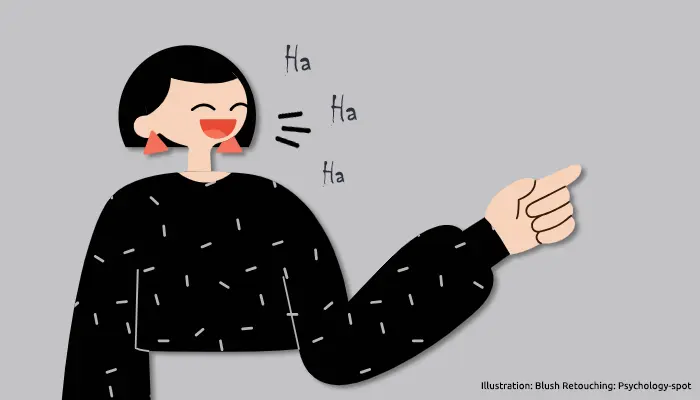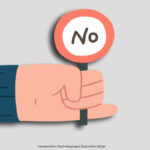
There are people who can be extremely unpleasant and sarcastic. Their tasteless jokes can hit where it hurts, causing considerable discomfort. If this contempt comes from those closest to you, the impact of their ridicule will be even greater and can even undermine your self-esteem, making you doubt yourself.
In fact, there is a type of teasing that psychologists from the University of Macedonia have classified as “disparagement humor,” which focuses precisely on degrading, humiliating or underestimating others. Curiously, these researchers have noted that the prevalence of this type of humor has increased in the last two decades.
More and more advertisements are including stories that involve making fun of other people in an attempt to gain attention and sell more. Therefore, it is not surprising that this type of humor is also becoming more common in our daily lives.
Why do people resort to disparagement humor?
In certain circumstances, we can all make inappropriate jokes. After all, a sense of humor is a difficult art to master. However, there are those who have a strong propensity for disparagement humor. These people make fun of others by humiliating, belittling and shaming them. Why?
In most cases, this phenomenon can be rooted in a tendency to catagelasticism, which involves feeling pleasure by laughing at others. In fact, researchers at the University of Granada discovered that people who enjoy making fun of others tend to find derogatory jokes funnier.
They also found that these people tend to feel superior and have lower levels of kindness, honesty and humility. It is not a casual relationship since behind disparagement humor there is usually hidden a need to feel better than the others.
These people can create a scenario in which they humiliate others to highlight themselves. That type of humor can be a way to get attention in the group. Indirectly attacking someone is a twisted demonstration of “power” to show off your supposed “superiority” to others. In fact, we cannot forget that derogatory jokes are, at their core, passive-aggressive behavior.
That means that in many cases, that type of humor comes from people with fragile egos, self-esteem issues, and insecurity. In fact, it is not unusual for those who have been ridiculed in the past. These people may resort to cruel jokes to prevent others from laughing at them. They think that the best defense is attack and they ridicule the others because they secretly fear that they will be laughed at, so with their practical jokes they divert attention from themselves.
How to respond to teasing – without losing your cool?
To deal with the disparagement humor of the others, the first step is to assume psychological distance. In this way we can create a kind of protective shield and avoid becoming defensive or losing our psychological balance. It’s hard? Of course! But not impossible.
It will help you to try to understand the person’s motives. Maybe your father-in-law or your aunt only uses that type of humor as a way to show you his affection because it is difficult for him to express his emotions in any other way. Or maybe it’s a dysfunctional way of dealing with your own feelings of inadequacy.
If it is a stranger, you can console yourself by thinking that this behavior is just the expression of a deep need to demonstrate his superiority to others, so that deep down, it reflects his own insecurity. Of course, understanding something does not mean justifying it. Understanding someone’s psychological reasons does not mean letting them humiliate us.
However, before taking the next step, it is advisable that you look inside yourself and ask yourself why that joke bothers you so much. What emotional trigger has he activated? What insecurity has he brought up? If jokes bother you a lot, it may be time to work on some weak points to stop reacting so viscerally to other people’s comments.
Just as there are people with a tendency toward catagelasticism, there are also those who are prone to gelotophobia, which is the fear of being laughed at. A study carried out at the University of Lleida found that people who fear being laughed at are more vulnerable to practical jokes. They are also more fearful of criticism and rejection, more emotionally reactive, and more likely to be hurt by disparagement humor.
That means that if you can control your underlying fears or insecurities, you’re unlikely to feel threatened by a joke. At the end of the day, remember that jokes are just that: jokes. Try not to make a storm in a teacup. Don’t give too much importance to what others think or say.
However, if teasing is unpleasant or continuous, you may need to stop it. You don’t need to get angry. Remember that your top priority is not to “win” the other person or “put them in their place” but only to preserve your serenity.
Therefore, limit yourself to expressing your position firmly. You can say: “That joke was in bad taste, I wish you wouldn’t say something like that again.” Remember that the best way to respond to teasing is to stay calm and not let those words affect you. You are much more than that.
References:
Blasco, A. et. Al. (2022) Vulnerable narcissism is related to the fear of being laughed at and to the joy of laughing at others. Personality and Individual Differences; 190: 111536.
Hatzithomas, L. et. Al. (2021) A superiority–inferiority hypothesis on disparagement humor: The role of disposition toward ridicule. Journal of Consumer Behaviour; 20(2): 923-941.
Torres, M. J. et. Al. (2019) Beyond the big five as predictors of dispositions toward ridicule and being laughed at: The hexaco model and the dark triad. Scandinavian Journal of Psychology; 60(5): 473-483.



